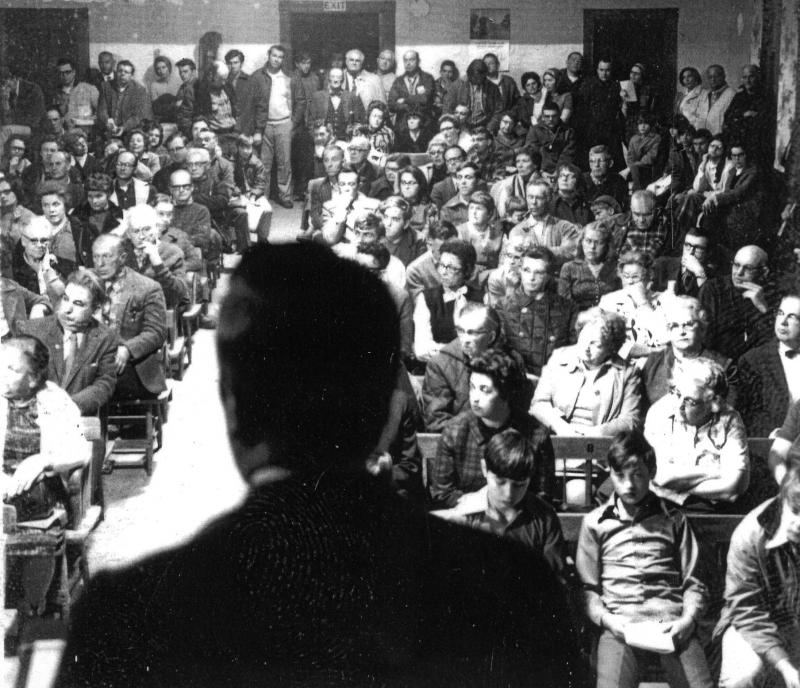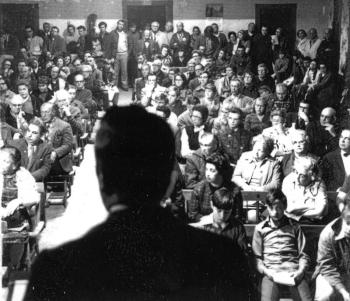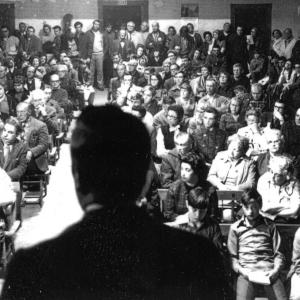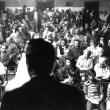This Week in Lincolnville: A few minutes of solitude
 When Town Meeting used to pack them in, a 1970s night at Tranquility Grange.
Photo from Lincolnville Historical Society
When Town Meeting used to pack them in, a 1970s night at Tranquility Grange.
Photo from Lincolnville Historical Society
 A humongous snapper snoozes on Coleman Pond.
Photo thanks to Liz Hand
A humongous snapper snoozes on Coleman Pond.
Photo thanks to Liz Hand
 Slab City II, by Alex Katz
Slab City II, by Alex Katz
 Alliums and chives....
Photo by Diane O’Brien
Alliums and chives....
Photo by Diane O’Brien
 When Town Meeting used to pack them in, a 1970s night at Tranquility Grange.
Photo from Lincolnville Historical Society
When Town Meeting used to pack them in, a 1970s night at Tranquility Grange.
Photo from Lincolnville Historical Society
 A humongous snapper snoozes on Coleman Pond.
Photo thanks to Liz Hand
A humongous snapper snoozes on Coleman Pond.
Photo thanks to Liz Hand
 Slab City II, by Alex Katz
Slab City II, by Alex Katz
 Alliums and chives....
Photo by Diane O’Brien
Alliums and chives....
Photo by Diane O’Brien
In case the photo doesn’t prod your memory, it’s Town Meeting week, starting with balloting on Tuesday, June 9 for town officials. The written balloting held two days before the actual meeting takes care of the first seven articles, which includes selecting a moderator for the meeting. There are two Selectmen seats with Keryn Laite and Ladleah Dunn running; two School Committee seats with Christine Stevens running; three Budget Committee seats with Reed Mathews running, and one CSD seat without a declared candidate. On the ballot are lines for write-in candidates. If you want to write in a name be sure to use both first and last names and fill in the oval in order for the vote to be counted.
Four other questions will be decided on Tuesday as well: whether to discontinue four roads as town roads and to compensate the people who live on those roads for that loss. The roads are Albert Blood Road, Lloyd Thomas Road, part of Martins Corner Road, and Thorndike Road. The polls, located in the school gym, are open from 8 a.m. to 8 p.m. Park at the end of the school nearest the Town Office and enter there. If you’re not registered to vote you may do so at the polls; to do so you must bring identification such as a driver’s license and something that shows your physical address in Lincolnville, such as a utility bill or a lease, etc.
Town Meeting will be held Thursday, June 11, 6 p.m. in Walsh Common at the school, where the remaining articles of the warrant will be discussed and decided. See the full warrant online or you can do it the old-fashioned way and pick up a copy of the town report which are now available at the Town Office, Drake Corner Store, Western Auto and Mike’s Align and Repair. The Town Report is dedicated this year to Bernard Young and Larry Thomas for their long time, outstanding service to the community with winter snow removal. This was the last winter for both of them; next year they can enjoy hearing the plows go by from their own beds like the rest of us. They’ve always taken such good care of us all during blizzards and ice storms and just plain crappy winter weather. Thank you! The annual Town Report has much more information than the articles to be decided at the Town Meeting. There are reports from committees and organizations, the budget and more. Be sure to get your copy.
The above photo of a 1970s era Town Meeting appeared in Life Magazine; a professional photographer was on hand that night to take the picture. Does anyone have that issue of Life? I’d love to know the date.
Wally and I debated whether Probate Judge Howard Barrett or David Nichols moderated that meeting, but we both agree that even from the back that figure is without doubt David Nichols. Who do you recognize in the crowd? We know we were there that night, but can’t find ourselves.
A Few Minutes of Solitude – 1951
[The Flagg farm is across from where Mike Sloan’s dental office is today]
It was just past six, and the sun had already been up for an hour. Mildred Flagg lifted the stove lid to check that the fire was burning down, replaced it noiselessly, then closed the damper, and gathered up her brown paper bags. Now if the floor didn’t creak she’d be free. She closed the screen door softly, then stopped to listen. Not a sound from the upstairs bedrooms. The children were still asleep.
She breathed easily now. She’d have a little time to herself after all. The grass, wet with dew, soaked her sneakers, but the coming day promised to be hot, and she hardly noticed as she walked to the garden. You couldn’t pick beans until the dew dried off or the plants would get rusty. But she was after peas today, and the cool of the day was the best time to pick them.
CALENDAR
TUESDAY, June 9
Election Day, 8 a.m. to 8 p.m., LCS gym
WEDNESDAY, June 10
Planning Board, 7 p.m., Town Office, televised
THURSDAY, June 11
Free Soup Café, noon-1 p.m., Community Building, 18 Searsmont Road
Annual Town Meeting, 6 p.m., Walsh Common, LCS
FRIDAY, June 12
Children’s Story Time, 10 a.m., Lincolnville Library
SATURDAY, June 13
Beach Farmers’ Market, 11 a.m. - 1 p.m., Dot’s parking lot
Every week:
AA meetings, Tuesdays & Fridays at 12:15 p.m., Wednesdays & Sundays at 6 p.m.,United Christian Church
Lincolnville Community Library, open Tuesdays, 4-7, Wednesdays, 2-7, Fridays and Saturdays, 9 a.m.-noon. For information call 763-4343.
Soup Café, every Thursday, noon—1p.m., Community Building, Sponsored by United Christian Church. Free, though donations to are appreciated for Community Building kitchen/bathroom fund
Schoolhouse Museum open by appointment only until June 2015: call Connie Parker, 789-5984
COMING UP
Saturday, June 13, Needle Felting Workshop, 12:30-4:30 p.m., Library
June 18, 5:30 p.m. will be Eighth Grade graduation
June 20, a half day, will be the last day of school and Field Day
June 21, Kate Braestrup, guest preacher, 9:30 a.m., United Christian Church
The tall pea vines, climbing up the chicken wire fences Tom had strung, made bushy rows that came up to her shoulders. She started picking the rounded pods, dropping them into the open bag at her feet. Her fingers instinctively passed by the ones that hadn’t filled out enough; they could wait for another day. She began to relax, out here in her dew-damp garden. She kicked off her shoes, and dug her toes into the good, warm dirt. For just a bit she could forget her responsibilities.
Mildred looked up from her work to the Bay below the farm, the view that had been her world since she was a young girl of nine. That was the year, 1934, when her parents, William and Ethel Coathup, had moved their family—Mildred and her four sisters, Barbara, Dorothy, Nancy and Winifred—to Lincolnville Beach from Massachusetts. They’d arrived the week of Thanksgiving on the train into Rockland. Ma had come up earlier to visit her best friend, Kitty Bullock, and decided that this was where she wanted to live.
Bert and Kitty Bullock were originally from Lincolnville; Mildred grew up hearing about how when Bert developed tuberculosis he was told to sleep outdoors, an old remedy for the disease. So both the Bullocks slept year-round in a gazebo in back of their house, on Atlantic Highway just south of the Beach. When Kitty went into labor with their first child she had to wade through deep snow to get inside the house to give birth! That story had always made an impression on Mildred, especially after she became a mother herself.
Not long after, the doctors said the Bullocks ought to move somewhere with a more healthful climate, so they went to Idaho. This time when Kitty was pregnant she was riding a mule to their mountain cabin with her first child in her arms. Their family would grow to six before they came back East, and met Bill and Ethel Coathup. And yes, the cure had been successful, for Bert survived.
Mildred thought about how attached her mother had been to Kitty in those days. The two had become friends because their husbands worked together at the Free Hospital in Brookline, Massachusetts, and the families lived next door to each other. Perhaps Kitty’s adventure-filled life appealed to Ethel. At any rate, after visiting her friend who had finally settled her family back in Lincolnville, the town they’d started out in, Ethel Coathup decided this was the place for her family as well. She bought a house on the spot, right next door to the Beach Inn [today’s Chez Michel]. Then she went home and told the girls. They couldn’t have imagined how their lives would change with that move.
Woodstoves for heat and cooking, water from a well, an outhouse! The Coathup girls were overwhelmed. But then they started school. The girls had never seen a one-room schoolhouse before they enrolled at the Beach school. Thank goodness for Grandma, Teresa Whalen, her mother’s mother, who lived with them. She had run a boarding house and cooked in a lumber camp; she knew how to organize a situation. She kept the meals on the table and the house running smoothly. Dad supported the family from afar, for he kept his job at the hospital in Brookline. Ma, a self-taught tailor, took in sewing to help with expenses.
Mildred looked back at the house briefly, automatically checking the smoke drifting up from the chimney. Woodstoves and chimneys were second nature to her now, her nose attuned to a too-hot stove pipe, her ears to a fire roaring out of control. Just this morning, as warm a July morning as there was, she’d had to build a fire hot enough to boil her husband’s coffee and cook his eggs.
She turned around. From where she stood in her pea patch, Mildred could just see the building where she’d gone through the eighth grade; even though the trees were rapidly filling in, the roof of the schoolhouse was still visible. The old place was closed tight most of the time now, since the town built the consolidated school up to the Center three years ago. Her own children would never go to a one-room school. Tommy, her oldest, wouldn’t start school for another year, and then the girls would follow. Ellen came next at four, then Doris at three, and now a new baby, Janie.
Betty Claytor and later, Alice Kennedy, had taught Mildred and her sisters. Those teachers had moved Mildred right along; she was only twelve when she started high school in Camden. That was way too young, she realized now, but the school was crowded, and her teachers probably thought she’d be better off in high school. Starting at twelve meant she was just sixteen when she graduated.
A good part of their growing up years was spent next door, at the Beach Inn. The popular restaurant, run by Ray and Mattie Welch, was open in the summer months serving lobsters and clams to travelers going by. Ethel worked there as a cook, while her girls moved through the hierarchy of kitchen jobs, the youngest starting as silverware girl. Mildred didn’t know there were that many knives and forks and spoons as she washed and dried that first summer. She graduated to washing dishes, then pots and pans, and finally out to the dining room waiting tables.
Mildred was only about eleven the year Ma had Edna, her sixth baby, another girl. Dad was in Brookline, since he could only come up to Maine during his vacations. So Mildred was sent to Kitty’s house with a note saying Ethel’s labor had started; Bert and Kitty took her to the hospital in Camden. Mildred hadn’t even realized her mother was pregnant! It seemed amazing that an eleven-year old girl wouldn’t notice her mother was about to have a baby, but she hadn’t.
There were plenty of playmates for the Coathup girls, and she had to admit, their childhood had been full. Mildred, still gazing out at the water, ticked them off one by one—Doug Frohock, Ruth Nichols, Gladys Thompson, Leon Hugenot, Eddie Stephens, Marilyn Davis, Dorothy Keller, even Tom Flagg who would become her husband, though he was a teen-ager when she’d moved here. The children picnicked and swam, diving off the dock near the mouth of Frohock Brook; she noticed lately how rapidly that dock was deteriorating. Some day a big storm would just sweep it away. They used to fish from it, catching eels, tommy cod and flounder. Her grandmother would cook the fish, even the eels, skinning and cutting them up, then frying them, and Mildred felt like she was helping to feed the family.
That thought brought her back to the present where she most certainly was feeding her family! By the time the summer was over she’d have canned over five hundred quarts of fruits and vegetables on her woodstove. What they didn’t grow themselves she bought or picked. Alton French would be getting in her usual two bushels of peaches—one to eat and one to can. Her next-door neighbor, Alice Pitcher, let her pick all the plums and pears she wanted from her trees.
In the spring she dug dandelion greens every day, washed them in cold water in the sink until her hands ached, then salted them down in a five gallon crock, adding new greens each day until it was full. She’d can these peas, and later the beans; she canned the mackerel they caught, and the pork and beef they raised. She and Tom butchered those animals themselves, cutting them up according to the charts in the USDA booklet she got from the Extension, even making enough sausage to fill a canner each year. Mildred made fifty pounds of butter each week, then sold most of it to Alton French for his store, Carlton French’s in Camden. Some weeks she got as little as thirty-five cents a pound for it, but never more than sixty-five.
She had come to the end of the last row, and none too soon, for her son’s voice was coming from the direction of the house where he stood at the open bedroom window. His voice was increasingly insistent—“Ma. Ma! MA!!” In the background she could hear the two younger ones wailing. The children were awake. Janie needed changing and a bottle, and everyone would want breakfast. Mildred’s day had begun in earnest.
Mildred Flagg passed away last week at the age of ninety. Many knew her as the postmistress of the Center Post Office for many years when it was located in a small building on Main Street. I always enjoyed stopping in there when I had something to mail, to have a chat with her and admire her latest knitting project. Even better, though, was the chance, later, to spend time hearing about Mildred’s life as a farm wife over looking Penobscot Bay. Three-year-old Doris in the story is well-known to most of us in Lincolnville as Doris Weed, who worked in the Town Office for many years.
Technology Petting Zoo
Do you feel a bit lost in the world of ever-changing technology? Well, thanks to a collection of gadgets on loan from the Maine State Library, we can all have a chance to try using some of them. The collection includes a Nook Simple Touch, a Kindle Paper White, a Kindle Fire, an Apple iPad Mini, a Nook HD+, and a Google Nexus. This is a great opportunity to try them out and see how they work, especially if you’re thinking of buying one. It is also a chance for anyone who already has one to learn more about all that it can do. Library hours are Tuesday 4 to 7 p.m., Wednesday 2 to 7 p.m., and Friday and Saturday 9 a.m. to noon. For more information, call 763-4343 or email.
June’s Presentation and Concert
The last Library Presentation and Concert of the season will be held next Wednesday, June 17 at 7 p.m. This month’s talent includes author Dorothy Cannell, an award-winning mystery writer, followed by the Pinwheel Brothers with their “original jaunty, upbeat string music”. As always, reserve tickets in advance by contacting Rosey Gerry, or call 975-5432. Tickets are $10 and proceeds benefit the library. After the summer’s hiatus, the popular monthly programs will start up in September.
Archaeological Dig
Plans are coming together for this summer’s dig at the cellar hole of Philip and Christiana Ulmer’s last house. The subject of a recent biography, Major Philip M. Ulmer, A Hero of the American Revolution, Ulmer was also an important player in our town’s earliest days. Harbour Mitchell and Randy Harvey, two active members of the Lincolnville Historical Society, have determined that a cellar hole, located on the land of Jim and Cindy Dunham, is most certainly all that remains of the house the Ulmers were living in when he died in 1816. The two men will be conducting an archaeological dig on the site early this summer. Students are invited to participate, and a few spectators are welcome as well, though due to the location, it involves a bit of a walk to the site. Later in the summer I expect Randy and Harbour can be persuaded to share their findings with the public. Contact Cindy Dunham, 789-5233 or email.
Coleman Pond News
This spring’s newsletter from the Coleman Pond Association arrived in the mail the other day; Whitney and Tony Oppersdorf, longtime residents on the pond, shared these observations:
The April 22 nd ice-out on Coleman Pond was the latest, by about a week or more, since 1999. There were fewer ducks than in the past: no buffleheads or ring necks, a few common mergansers, one golden eye, and a handful of wood ducks. The elusive “hoodies” have returned. There appear to be three or four loons on the pond, along with Canada geese which are nesting on the island. A breeding pair of eagles may be setting up housekeeping, which isn’t good news for any loon chicks. How nice to live where your nearest neighbors are feathered and web-footed! Another Coleman Pond resident, Liz Hand, saw an enormous snapping turtle sunning itself on a rock off her shore. She writes, “A friend kayaking here yesterday snapped (sorry) this guy sunning on the big rock across from Tooley Cottage. I watched the turtle with binoculars, he was massive”. This can’t be good news for anybody’s chicks or ducklings...
Edna Butterfield
We were sorry to hear that our old neighbor, Edna Butterfield, passed away. We were back yard neighbors, though with Frohock Brook and some woods between us; the Butterfields were some of the first people we met when we moved here in 1970. Sympathy to her family.
Natural Gas Pipeline?
If you’ve been following the news from Rockland you know that a new natural gas facility is being proposed for that city on a site near Route One. If the Maine PUC approves the project, a pipeline that currently ends in Windsor on Route 17 would be extended through Searsmont to Belfast, down Route 1 to Rockland, making natural gas available to towns along the way, e.g. Lincolnville. Read more about this project here.
Slab City in the New Yorker?
Local readers of the latest New Yorker magazine might have done a double take at the large color photo of a recent Alex Katz painting – Slab City II. The small white house surrounded by green woods, a narrow road in the foreground, appears to be the house on the corner of Chester Dean Road. As the caption reads, “At eighty-seven, Alex Katz is at the top of his game. … he opens shows at …. Colby College in Maine.” If you haven’t visited the Colby Art Museum in Waterville, I highly recommend it. An entire gallery is dedicated to Alex Katz, Lincolnville’s most famous artist, a nearly 65-year summer resident of Slab City.
Gardens
The flower bed in front of our house goes through distinct stages each season. After months of looking out at five foot drifts of snow, our view was transformed a month ago to drifts of spring bulbs in bloom. They’re gone now, replaced by the purples of alliums, columbine, creeping geranium and bachelor button, along with the in-your-face orange of poppies runamuck. Each year I hope the poppies finish up before the many pinks of the peonies. This year I think the peonies will win and cause a real train wreck of color!
Event Date
Address
United States





























